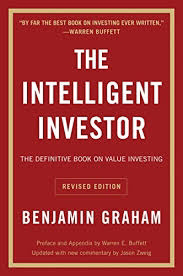Investing can seem like a daunting task, especially for beginners. The world of finance is filled with complexities that can easily overwhelm anyone trying to navigate it.
But fear not! With the right guidance and resources, anyone can become a savvy investor.
In this blog post, we will recommend you the top 10 books on investing that are perfect for beginners.
These books will help demystify the world of finance, equip you with essential knowledge, and set you on the path to financial success.
Often referred to as the bible of investing, this timeless classic provides valuable insights into the principles of value investing.
Benjamin Graham's wisdom teaches us to focus on long-term strategies, fundamental analysis, and the importance of emotional discipline when making investment decisions.
You can read summary here
2. "A Random Walk Down Wall Street" by Burton Malkiel:
Burton Malkiel challenges the idea that individual investors can consistently outperform the market.
He explains the concept of efficient market hypothesis and advocates for low-cost index fund investing.
This book is a must-read for those looking to understand the benefits of passive investing.
3. "Common Stocks and Uncommon Profits" by Philip Fisher:
Philip Fisher, a legendary investor, emphasizes the importance of in-depth research and understanding a company's competitive advantage.
He shares his insights on how to identify superior businesses and invest for the long haul, making this book a valuable resource for aspiring investors.
4. "The Little Book of Common Sense Investing" by John C. Bogle:
John Bogle, the founder of Vanguard Group, popularized index fund investing.
In this concise book, he explains the benefits of low-cost, diversified investing and highlights the pitfalls of trying to beat the market.
Bogle's straightforward approach makes this book accessible to investors of all levels.
5. "Rich Dad Poor Dad" by Robert Kiyosaki:
While not solely focused on investing, this book offers valuable lessons on financial literacy and mindset. Robert Kiyosaki shares his personal story and challenges conventional wisdom about money.
This book will inspire you to think differently about wealth accumulation and investing for your future.
6. "The Little Book That Beats the Market" by Joel Greenblatt:
Joel Greenblatt introduces the concept of value investing in a simple and engaging manner. He explains the magic formula for investing success, which involves identifying undervalued stocks and focusing on companies with high returns on capital.
This book provides a practical framework for beginners to start their investment journey.
7. "The Essays of Warren Buffett" by Warren Buffett:
Warren Buffett, one of the most successful investors of our time, shares his wisdom through a compilation of his letters to shareholders.
This book offers valuable insights into Buffett's investment philosophy, focusing on long-term value creation and the importance of a strong ethical foundation.
8. "Thinking, Fast and Slow" by Daniel Kahneman:
While not directly about investing, this book delves into the workings of the human mind and the biases that affect our decision-making.
Understanding behavioral finance is crucial for investors to avoid common pitfalls and make rational investment choices.
9. "One Up on Wall Street" by Peter Lynch:
Peter Lynch, renowned for his successful tenure as a fund manager at Fidelity Magellan, shares his investment strategies in an accessible manner. He encourages readers to invest in what they know, offering insights into how to identify potential winning stocks through everyday observations.
10. "The Bogleheads' Guide to Investing" by Taylor Larimore, Mel Lindauer, and Michael LeBoeuf:
This book is an excellent resource for beginner investors seeking a comprehensive guide to investing.
The Bogleheads' philosophy focuses on simplicity, low costs, and long-term investing.
It covers essential topics such as asset allocation, diversification, and tax-efficient investing.
Disclaimer: The information provided in this blog post is for educational purposes only and should not be considered as financial advice. Always do your own research and consult with a qualified financial professional before making any investment decisions.
Tags
Finance
